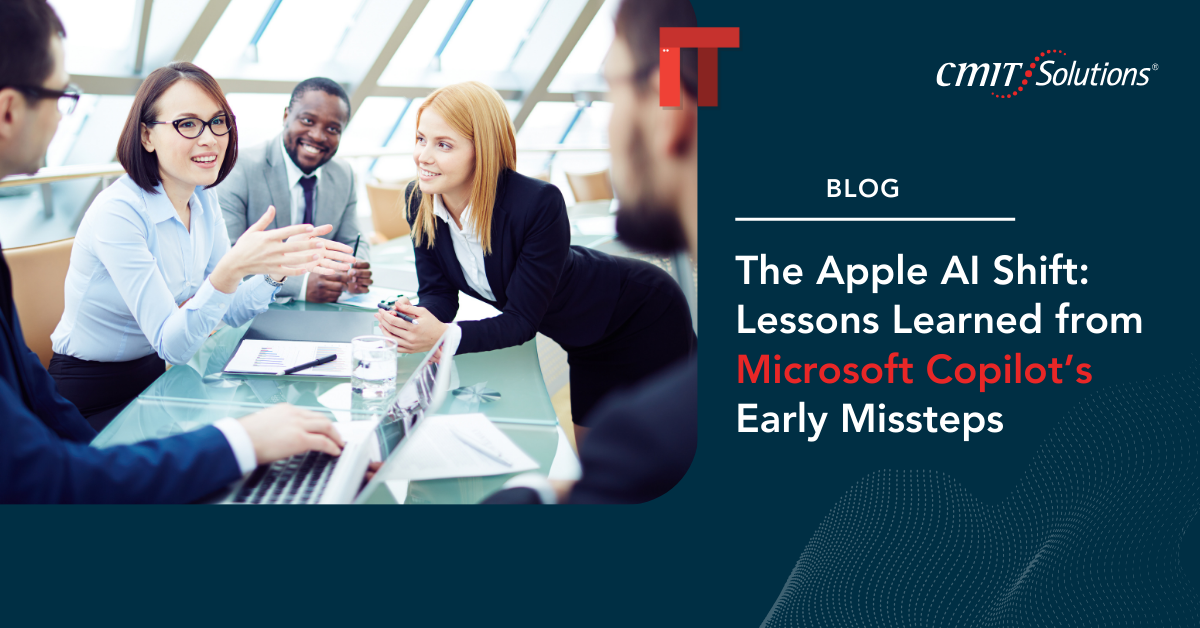Artificial Intelligence is transforming the way businesses work, and the world’s biggest tech companies are racing to lead the charge. At WWDC 2024, Apple unveiled its long-awaited entry into the AI market: Apple Intelligence. While polished and privacy-centric, Apple’s approach seems shaped not only by innovation—but also by the lessons learned from Microsoft’s earlier, more experimental rollout of Copilot across Microsoft 365.
For small and mid-sized businesses in Bothell and Renton, these tech industry shifts matter. AI is no longer just for enterprise-level organizations. Tools like Copilot and Apple Intelligence are rapidly being embedded into everyday applications—Word, Outlook, Teams, Mail, Safari, and more. As these tools evolve, so must your IT strategy.
At CMIT Solutions of Bothell and Renton, we help businesses understand and implement AI with a focus on productivity, security, and responsible deployment. In this blog, we examine Microsoft Copilot’s early struggles, Apple’s more cautious strategy, and what your business can learn from both.
Microsoft Copilot’s Bold Debut
When Microsoft Copilot launched in early 2023, the tech world was buzzing with excitement. Copilot was embedded into Microsoft 365 apps like Word, Excel, and Teams, promising to revolutionize workflows by automating tasks, drafting emails, summarizing meetings, analyzing data, and more—all through natural language prompts.
While the promise was groundbreaking, the rollout brought some significant challenges:
1. Lack of Guardrails
Early Copilot users encountered issues where the AI tool generated hallucinated data, incorrect insights, or poorly written emails. Without strong guardrails or user guidance, companies found themselves editing more than automating.
2. Security and Compliance Risks
Copilot had full access to documents, chats, calendars, and files. That made it powerful—but also dangerous. If user permissions were misconfigured, Copilot could surface sensitive information not intended for certain users.
At CMIT Solutions of Bothell and Renton, we’ve helped businesses navigate these risks by integrating Copilot with strict data access controls and IT Compliance in Bothell and Renton policies.
3. User Readiness and Adoption Gaps
Many businesses rushed to enable Copilot without training staff on how to use it effectively—or how to question its outputs. This created confusion, inefficiency, and reduced trust in the tool.
Copilot, in many ways, became a case study in how not to deploy AI without strategic planning and user enablement.
Apple’s AI Strategy: Polished, Private, and Predictable
Fast forward to 2024: Apple introduces Apple Intelligence. Unlike Microsoft, Apple focused on a measured, privacy-first approach. Apple Intelligence is integrated deeply into iOS 18, iPadOS 18, and macOS Sequoia, powering features like email summarization, message rewriting, smart replies, app actions, and personalized task automation.
The difference lies in the execution.
Apple limited its AI features to:
- Devices with powerful chips (A17 Pro, M1 or later)
- User-consented, on-device processing by default
- Private Cloud Compute for larger requests, with end-to-end encryption
- Context-aware responses with strict data boundaries
Where Microsoft opted for broad access and enterprise speed, Apple chose control and clarity. And while some critics say Apple is late to the party, others argue they’ve avoided Copilot’s most visible mistakes.
Key Lessons for Businesses in Bothell and Renton
Lesson 1: Don’t Deploy AI Without Understanding the Risk
Just because a tool is built into your software doesn’t mean you should enable it by default. AI assistants like Copilot and Apple Intelligence access your emails, calendars, documents, and chats. Improper configurations can lead to sensitive data exposure.
Our Cybersecurity Services in Bothell and Renton help businesses protect their data while rolling out AI features. We apply role-based access, MFA, encryption, and audit logging to ensure tools like Copilot are secure by design.
Lesson 2: Employee Training is Essential
Many of Copilot’s early frustrations came from users expecting perfection. In reality, AI is a helpful assistant—not a replacement for critical thinking. Employees need training on prompt engineering, interpreting AI outputs, and spotting inaccuracies.
At CMIT, our IT Support Services in Bothell and Renton include employee enablement programs that bridge the knowledge gap between AI tools and day-to-day usage.
Lesson 3: Privacy-Centric AI is the Future
Apple’s focus on local processing and secure cloud usage shows where AI is headed. Businesses will need to prioritize data privacy, even when working with third-party platforms. That means understanding where your AI tools store, process, and transmit data.
Our Bothell and Renton Managed IT Support includes audits, vendor risk assessments, and policy development to ensure you meet internal and regulatory data privacy standards.
Use Case: Navigating AI in a Hybrid Workplace
A law firm in Bothell wanted to roll out Copilot for Microsoft 365 but had concerns about sensitive case files and confidential client communications. CMIT Solutions conducted a full risk analysis, adjusted access controls, and implemented Intune MDM for remote device management.
We then:
- Configured Copilot to exclude non-compliant storage locations
- Set conditional access policies through Azure AD
- Provided employee training on using Copilot in Teams and Word
- Established daily data retention policies
The firm was able to boost productivity with AI while keeping sensitive data protected—showing that success lies not in the tool, but in the strategy behind it.

The Future of AI: Microsoft vs. Apple, and What It Means for SMBs
Apple and Microsoft are now officially competing for the AI productivity crown. Microsoft brings deep enterprise integration, an aggressive feature rollout, and advanced cloud services. Apple counters with user-first design, privacy, and elegant device-level integration.
For small and mid-sized businesses, this competition creates choice and opportunity. But it also creates complexity.
Which tools will your business standardize on? How will AI interact with your existing systems, compliance requirements, and cybersecurity controls? Can your team handle this transition confidently?
That’s where CMIT Solutions of Bothell and Renton comes in. Our job is to filter out the noise, evaluate these technologies through the lens of your business, and implement AI in a way that drives real outcomes.
What to Do Before Enabling AI in Your Business
Before turning on Copilot or Apple Intelligence, consider the following action steps:
- Audit your current data structure and user permissions
- Define clear policies for AI usage, access, and content ownership
- Train your staff on both the capabilities and limits of AI
- Secure all endpoints with device management and encryption
- Review compliance requirements and legal responsibilities
- Work with an IT partner to manage risk and scalability
We offer full support in each of these areas through our Outsourced IT Support in Bothell and Renton—bringing enterprise-grade protection to small business environments.
Conclusion: Learn from the Leaders, Avoid Their Mistakes
The race to integrate AI into everyday business tools is exciting—but also full of risks. Microsoft Copilot’s early challenges taught us that AI must be deployed thoughtfully, with human oversight and strong security. Apple’s measured rollout of Apple Intelligence proves that trust, privacy, and usability matter just as much as innovation.
At CMIT Solutions of Bothell and Renton, we help your business harness the power of AI—without falling into the same traps the industry’s biggest players have already exposed. Our team combines hands-on technical expertise with strategic IT consulting to ensure your AI rollout is secure, productive, and sustainable.
Explore our full range of AI-ready IT services at https://cmitsolutions.com/bothell-wa-1091/
Or call (425) 296-0329 to speak with an advisor today.
The AI shift is happening. Let’s make sure your business is ready.





